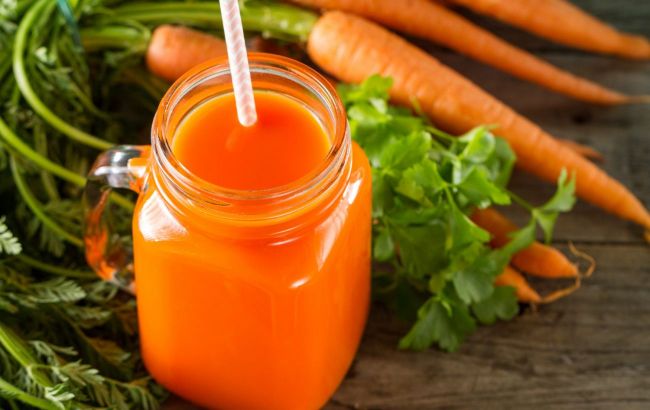This juice lowers blood pressure and protects heart: Drink it daily!
 What are the health benefits of carrot juice (photo: Freepik)
What are the health benefits of carrot juice (photo: Freepik)
Carrot juice is not just a tasty beverage but a real source of vitamins and beneficial substances. Nutritionists are increasingly emphasizing its positive effects on vision, skin, and immunity. So what exactly are the benefits of this bright vegetable juice? Today answers.
What is known about the juice
One cup of canned carrot juice contains the following nutrients:
- 94 calories
- 2 g of protein
- 0.4 g of fat
- 22 g of carbohydrates
- 2 g of fiber
- 9 g of sugar
This juice can also contain a more concentrated dose of other compounds in carrots, including natural sugar and beta-carotene. Therefore, it is important to monitor how much you drink.
Dietitian Theresa Gentile explained that making one glass of carrot juice requires much more carrots than you would usually eat at one time.
The most well-known nutrient found in carrots is beta-carotene, which is a precursor to vitamin A. A serving of whole carrots can easily help you meet 100% of your daily vitamin A intake.
Carrot juice can also help support eye health, the immune system, and heart health due to these nutrients:
- vitamins C, E, and K
- niacin (vitamin B3)
- biotin (vitamin B7)
- magnesium
- iron
- potassium
- antioxidants such as lutein
Carrot juice is a particularly rich source of potassium, which the body needs to maintain normal blood pressure, as well as for muscle and nerve function.
You can get a good amount of potassium (400 milligrams per cup) from raw carrots. Meanwhile, a cup of carrot juice contains nearly 700 milligrams of potassium, which is more than 25% of the daily requirement for this mineral.
A 2011 study in which participants drank 450 ml of carrot juice daily for three months observed a slight improvement in systolic blood pressure. These results may lead to a reduced risk of heart disease and inflammatory conditions.
Is it better to drink juice or eat carrots?
Whether you eat carrots or juice them, you will get nearly the same nutrients. The difference lies only in the amount of those nutrients.
The main advantage of juicing carrots is that you get a more concentrated dose of certain nutrients present in whole carrots.
When you juice carrots, the leftover pulp contains a lot of fiber. So you don’t get as much fiber in the juice.
On the other hand, eating carrots provides more fiber but less beta-carotene. Depending on your dietary goals, consuming carrots traditionally might be more beneficial.
This material is for informational purposes only and should not be used for medical diagnosis or self-treatment. Our goal is to provide readers with accurate information about symptoms, causes, and methods of detecting diseases. RBС-Ukraine is not responsible for any diagnoses that readers may make based on materials from the resource. We do not recommend self-treatment and advise consulting a doctor in case of any health concerns.

